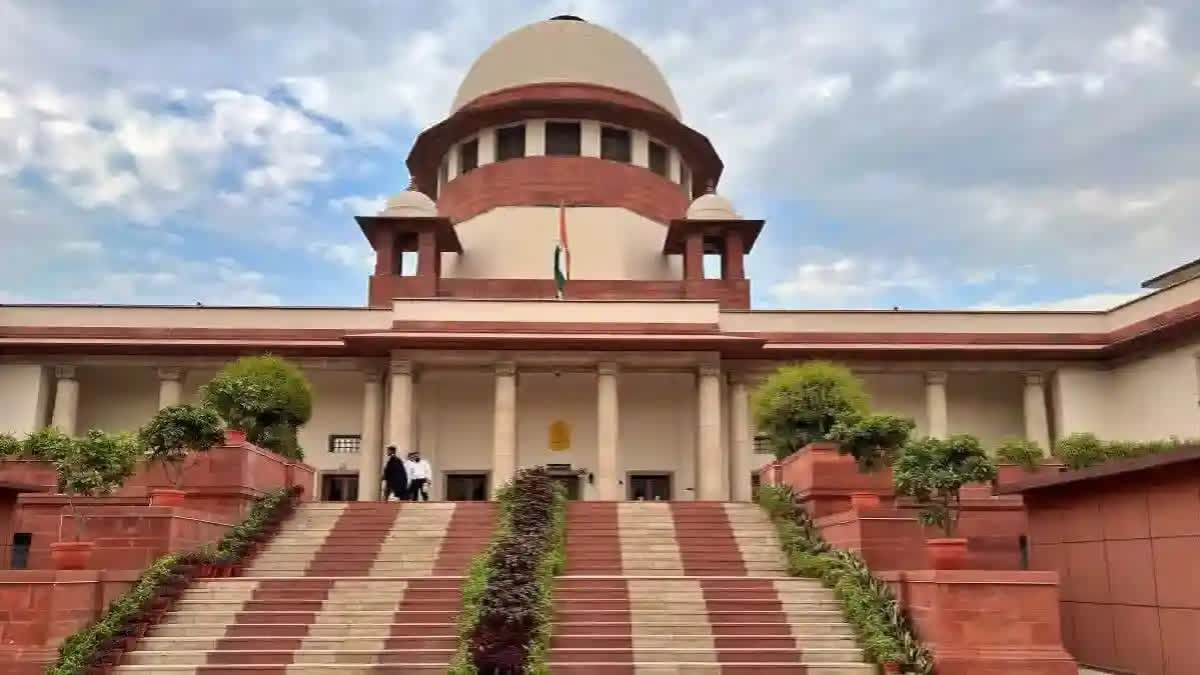New Delhi: The Supreme Court has suggested a mechanism where the investigation is carried out by the state corruption bureau and also by the Enforcement Directorate jointly under the supervision of a former DGP, or a former high court judge.
The apex court's suggestions came while it stayed further investigation against arrested Enforcement Directorate (ED) officer Ankit Tiwari by the Tamil Nadu police’s anti-corruption wing last month on the charges of bribery. It emphasized that to eliminate the apprehension of political vendetta, the authorities need to find some "transparent mechanism and then the investigation can commence".
A bench comprising Justices Surya Kant and K V Vishwanathan also sought a reply from the Tamil Nadu government on ED's petition for entrusting the probe to the CBI, adding urged the state government to explore the possibility of developing a mechanism for ensuring fair and independent probe in all cases of money laundering. The apex court has scheduled the matter for further hearing after two weeks.
During the hearing, Solicitor General Tushar Mehta, representing the ED, said that the FIR in the matter on the state government's website was blocked under the order of the competent authority. “Meanwhile, we are not mentioning in the order, please try to explore and tell us a mechanism for fair and transparent, and which must achieve the ultimate object of fair investigation so that no suspect goes scot-free," said Justice Kant.
Senior advocates Kapil Sibal and Amit Anand Tiwari, representing the Tamil Nadu government, insisted that this direction of the court should apply to all states. To which Justice Kant said, "Under our monitoring and supervision, let us start with Tamil Nadu", and added that the court can lay down a general law. Mehta asked why Tamil Nadu was insisting on it. “We have to first evolve a mechanism and then apply to all states, but let us see in your state (Tamil Nadu), how do you come out with….”, said Justice Kant.
Justice Viswanathan told Sibal, “You can suggest a mechanism or body, ultimately it (the investigation) has to go to that. Section 6 is a different provision in the Delhi Special Police Establishment. Somebody has to look into the inter-state ramifications and, at the same time keep the object of punishing the guilty, preventing vindictive arrest. Unless that is evolved, how will it arrive at this”.
Mehta said if there is a vindictive arrest by the Enforcement Directorate, there is a court to examine it. “Allegation and counter allegation cannot be allowed for those involved in corrupt practices...you can suggest a mechanism which can be applied on a pan-India basis, you can suggest a module for example, let the matter be investigated by state corruption bureau and also by ED by jointly under supervision of former DGP, maybe a former high court judge. Then the same mechanism can be applied for other states also, the persons will be changed (in Tamil Nadu we need a person who understands Tamil language for documents)," said justice Kant. Sibal said there are FIRs filed and the ED is not prosecuting.
“The moment we take cognizance, it is a statutory mandate that those who investigate the predicate offence will share the details with us. That is the system and they (Tamil Nadu) are not even sharing the FIR”, said Mehta.
Justice Vishwanathan observed ED and CBI offices are all over India. "If goes on what will happen to our set-up," he said. Mehta said to every question there is an answer in the statute. “You are vindictive and they are vindictive, suppose in a given scenario your officers are sitting in states…if there is tit-for-tat vindictive action, what will happen to the country”, said Justice Vishwanathan.
Mehta cited the arrest of CBI officers by West Bengal police and added that the Chief Minister entered CBI’s office. “Some kind of mechanism, screening before the action…”, said the bench.
“To eliminate the apprehension of political vendetta, or so-called political vendetta…because of allegation and counter allegation, we cannot allow persons who are actually involved to go scot-free. Let us find out some transparent mechanism and the investigation can commence….”, said Justice Kant. Sibal said statutory provision gives them unbridled power to destroy the federal structure. Mehta told Sibal you challenged it and lost it.
“Don’t go ahead with the investigation in this FIR and do not file chargesheet…”, said the bench, and asked the ED to not proceed ahead after TN counsel said there is an Enforcement Case Information Report (ECIR) in the matter.
Concluding the hearing, the bench said the material collected so far by the state should be produced before the court. Mehta said the state agency must be asked to produce the materials seized during a raid at the ED's office in Madurai on December 1, 2023. The Enforcement Directorate (ED) has moved the Supreme Court against the alleged non-cooperation of Tamil Nadu in sharing criminal complaints and FIRs concerning offences under the Prevention of Money Laundering Act (PMLA)
The ED has also prayed that the probe into the bribery allegations against its officer Ankit Tiwari, be handed over to the Central Bureau of Investigation (CBI). It is currently being probed by the Tamil Nadu Directorate of Vigilance and Anti-Corruption (DVAC).
In the instant case, the ED sought a direction to transfer a bribery case related to the alleged recovery of Rs 20 lakh from Tiwari from Tamil Nadu's Department of Vigilance and Anti-Corruption to the CBI.
Read More



